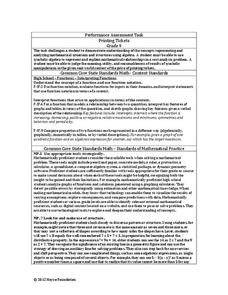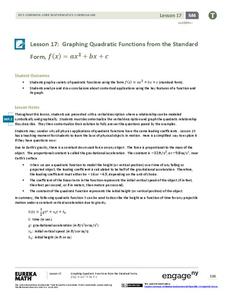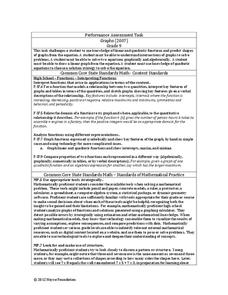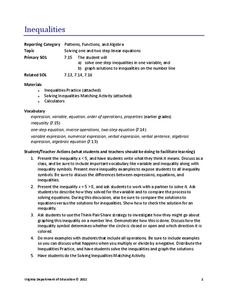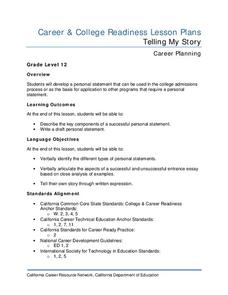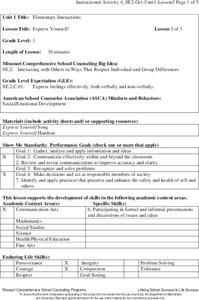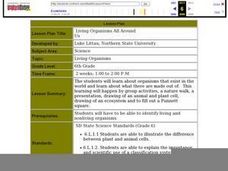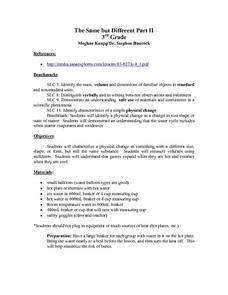EduGAINs
Data Management
Using a carousel activity, class members gain an understanding of the idea of inferences by using pictures then connecting them to mathematics. Groups discuss their individual problems prior to sharing them with the entire class....
EngageNY
Solving Basic One-Variable Quadratic Equations
Help pupils to determine whether using square roots is the method of choice when solving quadratic equations by presenting a lesson that begins with a dropped object example and asks for a solution. This introduction to solving by...
Inside Mathematics
Printing Tickets
Determine the better deal. Pupils write the equation for the cost of printing tickets from different printers. They compare the costs graphically and algebraicaly to determine which printer has the best deal based upon the quantity of...
EngageNY
Graphing Quadratic Functions from the Standard Form
Use context to explain the importance of the key features of a graph. When context is introduced, the domain and range have meaning, which enhances understanding. Pupils use application questions to explore the key features of the graph...
Inside Mathematics
Graphs (2007)
Challenge the class to utilize their knowledge of linear and quadratic functions to determine the intersection of the parent quadratic graph and linear proportional graphs. Using the pattern for the solutions, individuals develop a...
EngageNY
Nonlinear Models in a Data Context
How well does your garden grow? Model the growth of dahlias with nonlinear functions. In the lesson, scholars build on their understanding of mathematical models with nonlinear models. They look at dahlias growing in compost and...
EngageNY
Ratios II
Pupils continue the study of ratios by creating ratios from a context. The contexts present more than two quantities, and scholars create contexts that match given ratios.
Virginia Department of Education
Inequalities
Not all resources are created equal — and your class benefits! Scholars learn how to solve one-step inequalities using inverse operations. They complete an activity matching inequalities to their solutions.
Florida Alliance for Arts Education
Theatre Arts
What skills do storytellers employ to bring to life the characters and events in their tales? After listening to a recording of a Haitian folk tale, class members consider how tone of voice, pace, and gestures can be used to enliven a...
California Department of Education
What Matters to Me?
Whether you're a self-starting entrepreneur or a cubicle commando, finding a career that suits your personality is a must! The second lesson in a series of five career and college lesson plans focuses on work ethic and values. Learners...
California Department of Education
College: Plan Well and Pay Less
They say you gotta pay to play, and postsecondary education is no exception! High schoolers learn how to research and analyze the cost of postsecondary education as well as the different ways to pay for schooling. Learners then work...
California Department of Education
Telling My Story
Entrance essays are the ultimate sales pitch! Show your seniors how to market themselves in the first of six college and career readiness lesson plans. Pupils discover the do's and don'ts of writing personal statements through research,...
California Department of Education
Hazards in the Workplace
Safety first! Safety first! A short video and a PowerPoint presentation introduce job seekers to child labor law awareness, safety standards, and ways to reduce workplace injuries. Class members first take a short workplace...
California Department of Education
How to Succeed in Life
Is it possible that six simple traits lead to a happy, successful life? Part four of a six-part series of college and career readiness lessons examines the effects of character in determining success. Working groups discuss...
Missouri Department of Elementary
Express Yourself!
Encourage scholars to express themselves with help from an engaging song. Sung to the tune of "London Bridge is Falling Down," participants sing phrases that offer tips for dealing with emotions—sad, happy, worried, proud, mad, and...
Curated OER
Blasphemy! Salman Rushdie and Freedom of Expression
Students explore the concepts of blasphemy, censorship and freedom of expression through the lens of Salman Rushdie. They also consider how these issues have been reflected in US history.
Curated OER
Tobacco in North Carolina
Fourth graders examine the depiction of North Carolina tobacco farms in several photographs. They work in small groups to prepare an argument for a class debate and create promotional signs to advertise their point of view about tobacco...
Curated OER
Oops, I Did Not Say it Right
Your little learners listen to the story Chicken Little in order to explain how behavior affects interpersonal communication. They engage in a class discussion to determine the differences between truth and gossip.
Curated OER
Character Nichos
This art lesson also incorporates a study Mexican and South American cultures and art. Young scholars then create Nichos, which are small, decorated boxes commonly found in homes and public places, or displayed on walls or pedestals.
Curated OER
The Human Body
Seventh graders explore the basic body systems and design a commercial advertising one of them. They also create a body systems handbook.
Curated OER
Living Organisms All Around Us
Sixth graders study organisms that exist in the world and what they are made up of. They participate in a nature walk, a presentation, a drawing of an animal and plant cell, draw a ecosystem, and fill out a Punnett square.
Curated OER
Weather Dance
Students study weather and focus on specific dance concepts. They are introduced to different ty es of clouds and how they are formed. Next, they study wind and why it occurs.
Curated OER
The Environment
Students explore the issues that influence our environment and research ways to decrease the negative impact that humans have on the environment. Misconceptions about environmental issues are addressed in this lesson.
Curated OER
The Same, But Different Part II
Learners characterize a physical change as something that changes to a different size, but retains its basic substance. They measure volumes using milliliters, and perform an experiment that proves that gases expand when hot and contract...
Other popular searches
- Verbal Communication
- Non Verbal Communication
- Examples of Verbal Irony
- Non Verbal Communication
- Algebra 2 Verbal Equations
- Verbal Communication Skills
- Verbal Irony
- Non Verbal Language
- Verbal Irony Cartoons
- Verbal Expressions
- Verbal Demonstration
- None Verbal Communication




